Economic Inequality in the United States
Does America have an Income and Wealth Disparity Problem?
If you read The Gospel and Economic Justice you already know that economic justice is important to God and important to the gospel of Jesus. The question here is whether our economy promotes economic justice or injustice? Let's start with the basics.
First, we can all agree that Americans are understandably proud that our country was founded on principles of liberty, justice and equality. In America, there was to be no king or queen; no royalty. We were the haven for the common man. America's economy grew and prospered because of a vibrant middle class; the largest in the world.
Many Americans think that we still have a growing and vibrant middle class; that our economy fosters equality. Unfortunately, that is not true. We are indeed a wealthy and prosperous country. However, virtually all of the new wealth (GDP) we create now goes into the pockets of the top 10%; mostly to the top 1%. Income and wealth inequality in America has reached historically high levels not seen since 1929, just before the Great Depression.
The chart below provides an insightful look at the relationship between the income (top line) and highest tax rate (bottom line) of the top .01 percent since 1017. Specifically, the top line shows the average income of the top .01% as a multiple of the average income of the bottom 90%. You can see we are in uncharted territory today as the rich, on average, make nearly 1000 times as much as 90% of us do. This is the highest wealth inequality in at least a century.
You can see that, as a general rule, as tax rates on the wealthy decline, their income goes up. When the discrepancy (high income/low tax) is greatest, our country as a whole, suffers. Note the lines immediately before the Great Depression and Great Recession. We now have levels of high income/low tax rates not seen since 1929. You can see that the best of times for our country happened when the spread between income and taxes for the wealthy was the most narrow (1950's era).
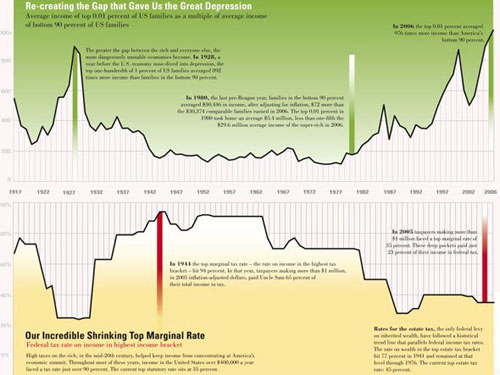
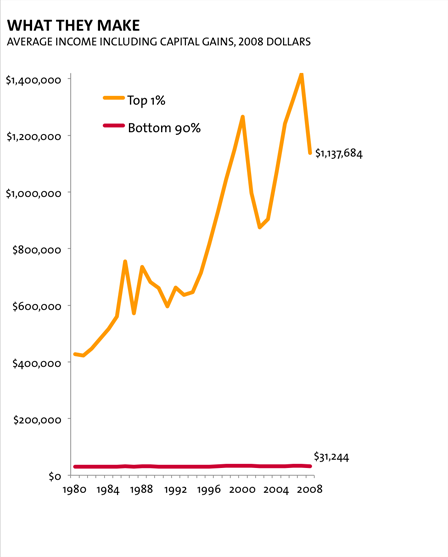
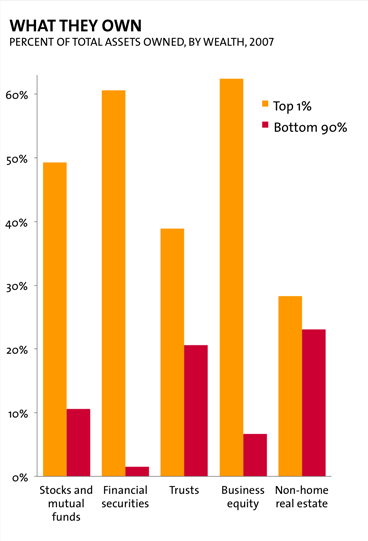
You can see from the next chart how the rich have prospered since "The Reagan Revolution" in 1980, while most of the rest of us have seen our wages and income (especially when inflation is factored in) decline. Even worse, the inequality is accelerating.
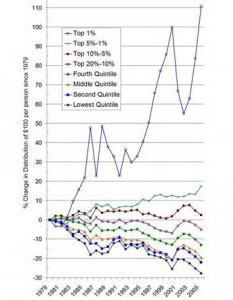
Look at the top 1% go!
But, it wasn't always this way:
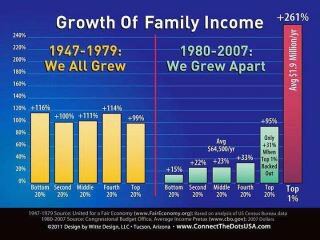
Income Inequality Before and After 1980
Today, the bottom 80% of Americans share only 7% of the wealth. Look at the difference in income between the top .01% and the bottom 90%! Wow.
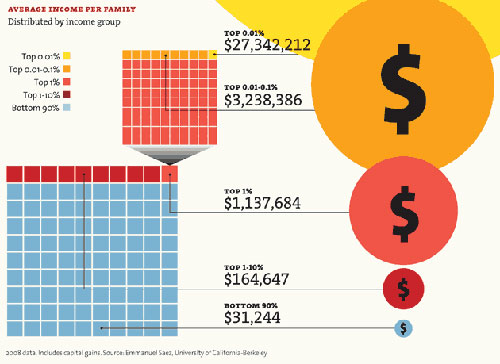
Average Household Income By Income Group
The correlation between where we were in 1929 and where we find ourselves now is scary. I won't post all the charts here, but visit 30 year growth of income inequality to see how income inequality and low tax rates for the rich are nearly identical now to where they were in 1929.
Economists have long said that the key to wage growth is increased worker productivity. Yet.
The typical worker has had stagnating wages for a long time, despite enjoying some wage growth during the economic recovery of the late 1990s. While productivity grew 80% between 1979 and 2009, the hourly wage of the median worker grew by only 10.1%, with all of this wage growth occurring from 1996 to 2002, reflecting the strong economic recovery of the late 1990s.
Despite American workers being the most productive workers in history, and creating vast amounts of wealth, their salaries are in decline.
Here's a chart that shows how productivity gains used to benefit everyone (green bars) but since 1979 have mostly only benefitted the rich (red bars).
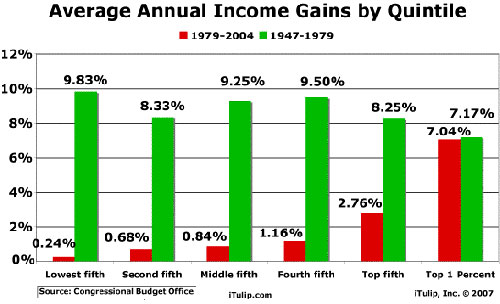
Income Gains per Quintile -- before and after 1979
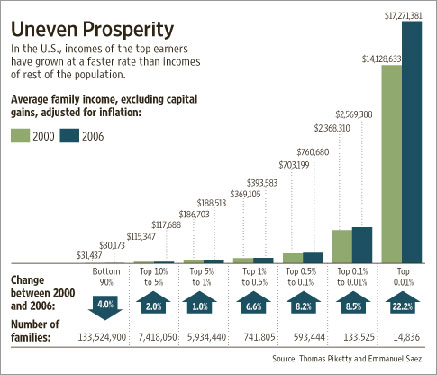
Uneven Prosperity: Bad in 2000, even worse in 2006
Yet another chart showing how income has radically shifted to the wealthy after "Reaganomics" was implemented. "Trickle down" never trickled down. How could we be so naive as to really believe it would?
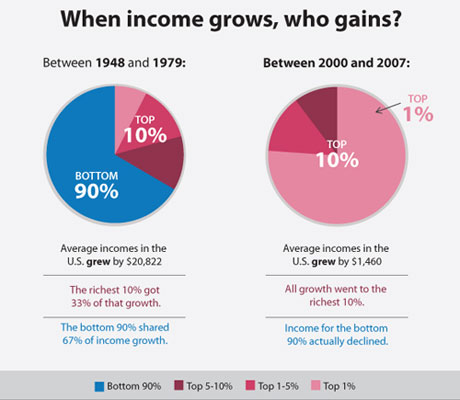
Along these same lines, you might "enjoy" this interactive chart.
Some say, "well, at least we're better than most countries when it comes to economic inequality." Unfortunately, that's also not true. One of the most respected measurements of income inequality is the Gini Coefficient. By that measure, the United States ranks poorly; tied with countries like Mexico and China, trailing Russia.
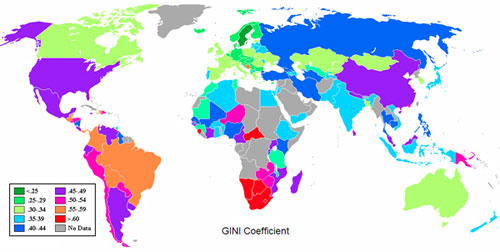
Still others argue that even if income inequality is bad, at least in the United States economic mobility is good. You often hear conservative politicians (usually while expounding on the "need" for tax breaks for the wealthy) say:
America is the greatest land of opportunity there ever was. Perhaps our economy does reward the most successful people and punish unsuccessful people -- but, at least in the United States, it is relatively easy to become successful (and wealthy) if you work hard.
Yet again, unfortunately, this is also simply not true. Not only are we terribly unequal but even our economic mobility is poor. Here's an article discussing what happened to economic mobility in the US?
Income and wealth inequality are not just bad for those on the short end of the stick. It's actually bad for everyone. Economic experts have stated:
A strong middle class supports improved productivity and investment, while high inequality can have real, pernicious effects on both. High inequality also makes the economy less stable, which can, as we've seen in the past few years, have devastating effects on the opportunity for millions of American families.
Inequality means everyone doesn't get a fair shot, which drags down our nation's economic productivity A strong middle class is positioned to make investments in education and incubate the next generation of high skilled workers, inventors, and entrepreneurs, which pushes up long-term economic growth primarily (though not exclusively) through their effects on productivity.
Studies have shown that concentration of wealth is by far the strongest predictor of violent revolution. It's not just poverty but also the anger that grows from a sense of economic injustice. And all of this undercuts the pillars that hold up our democratic system.
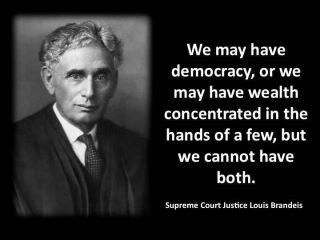
As Justice Louis Brandeis said above, democracy doesn't work well with economic inequality. MIT economisit Daron Acemoglu talks about this in his new book, Why Nations Fail: The Origins of Power, Prosperity, and Poverty -- where he says:
The real problem is that economic inequality, when it becomes this large, translates into political inequality.
When one person can write a check to finance your whole campaign, how inclusive will you be as an elected official to listen to competing voices?
So, what has caused it? The major drivers have been globalization and technology which has allowed companies to outsource many relatively low-skill and manufacturing jobs. Companies that couldn't adapt went out of business. The result has been a decline in the ability of blue collar workers to demand good wages. How could they compete with workers in China and India?
But, we have failed to adapt to take care of those most impacted by globalization. We should have put resources into education and training of the workforce for new, higher-value jobs. We should have invested in education, clean energy and infrastucture that would have made our society more efficient, competitive and created good jobs here at home. We should have strengthened our safety net, including a move to universal health care.
Some will say we can't afford to do that. But, that's just not true. It's simply a matter of priorities. We have the money. Heck, we're the richest country in the world. It's just all going to the top 1%. Obviously part of that money needs to be re-directed to do these things that are good for the common good, that will lift up the the poor and middle class, and thereby help our whole society. Frankly, it is immoral and unChristian that we have not done so. Instead of raising tax rates on the wealthy, we have cut them to historically low rates.
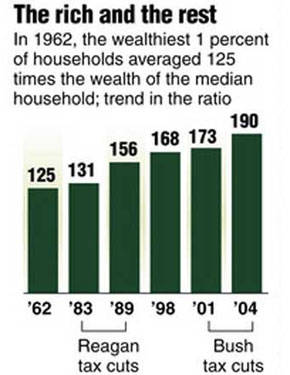
Increased Wealth Gap After Reagan - Bush Tax Cuts
The Reagan, Bush (and Gingrich) tax cuts have also contributed mightily to economic inequality by increasing after-tax income of especially the wealthy and reducing income the government can spend on programs that help the poor and middle class.
You owe it to yourself to visit this page to see how, despite all the protestations to the contrary, the US is now an extremely low-tax country (due mostly to tax cuts for the wealthy) and, in particular, our corporate tax revenues have plunged in recent years (due mostly to corporate tax breaks). We discuss this more at The Truth About Spending in America and Tax Inequality in the United States.
Yes, incredibly, we've seen the rich become fabulously wealthy; while the middle class shrinks and the swelling ranks of the poor are hurting. We've seen the unemployment, the foreclosures, the hunger, the homeless and our response has been to cut their assistance so the rich can pay less in taxes and pocket even more. How stupid. How unChristian. How unGodly.
We face stark choices in the near future. We have a deficit that must be dealt with. We can choose to fix that problem by cutting bloated health care costs and raising taxes on the wealthy or we can choose the path our conservative politicians propose which means more tax cuts for the wealthy and much more serious cuts in support for the poor and middle class (the common good).
 Custom Search
Custom Search